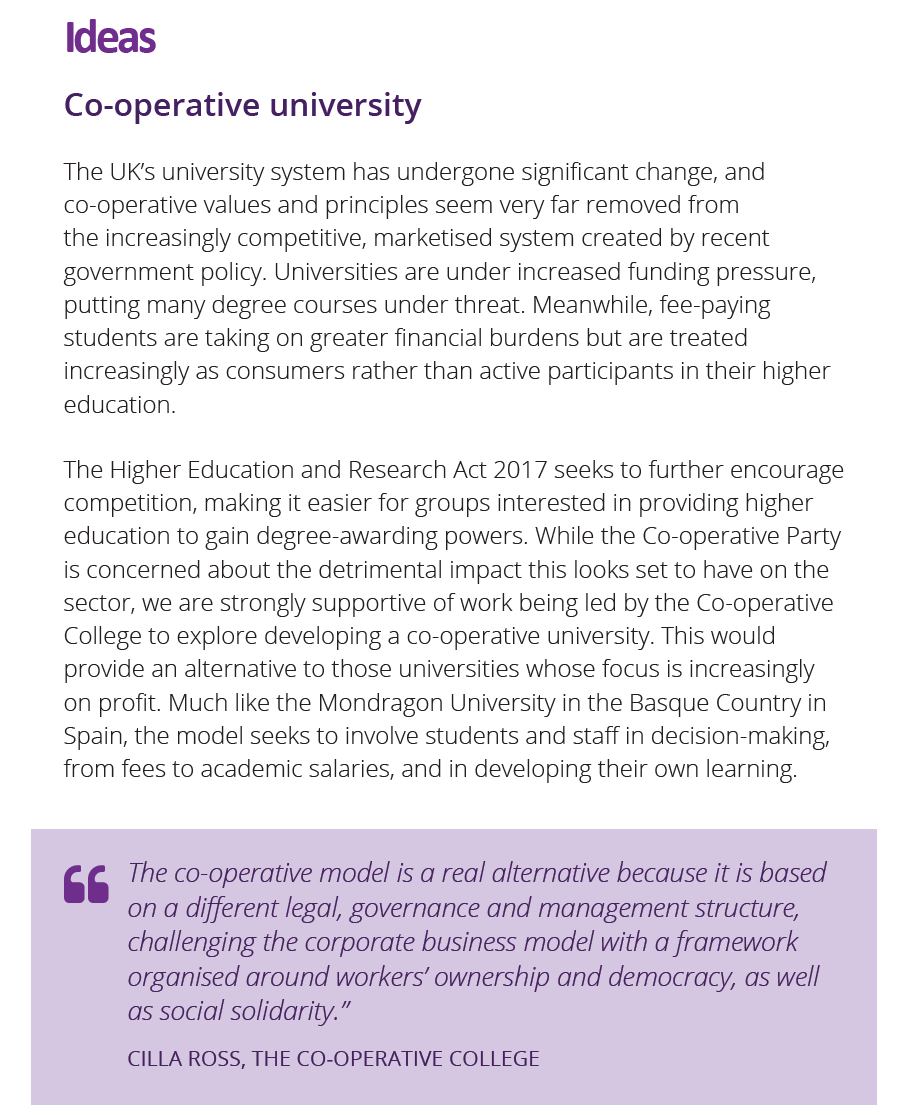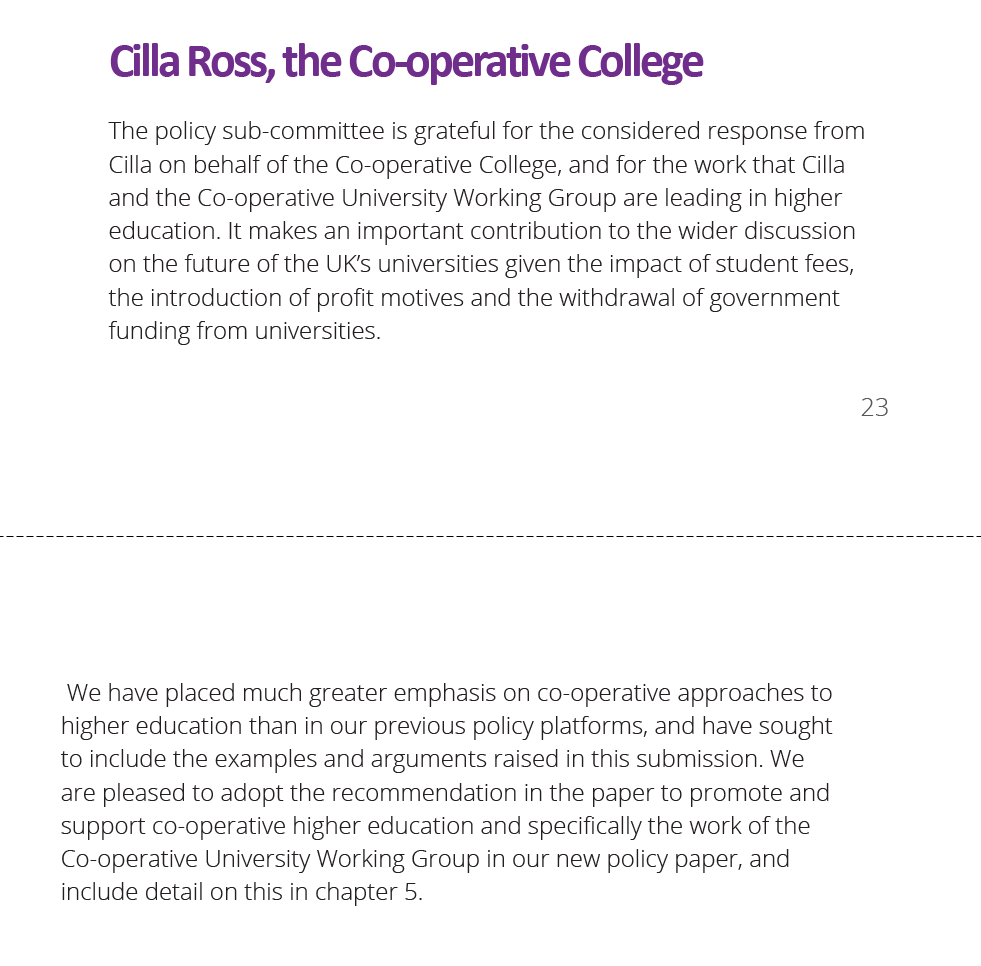In September 2016, in the midst of the Higher Education and Research Bill, Mike Neary and I, together with Cilla Ross and Simon Parkinson from the Co-operative College, wrote a blog post for the Co-operative Party’s website about co-operative higher education. We argued,
“There is nothing within the current legislation that would preclude a more radical form of university from being established: a co-operative university, based not on markets and privatisation but on collaboration and co-operation.”
In July this year, the Co-operative Party were seeking policy recommendations and so we submitted an adapted version of our blog post to the Party for consideration. Therefore, I was pleased to see that our submission (.doc) made its way into the Party’s Education Policy document, published in October 2017 (PDF). I’m told the idea got a round of applause at the Party’s annual conference, too.

Here is the feedback on our submission:

Political support for the idea of co-operative higher education is very welcome. The Co-operative Party was established 100 years ago and since 1927, has had an electoral pact with the Labour Party. It has 38 MPs in the House of Commons, all of whom are members of the Parliamentary Labour Party.
There is a serious problem with the model of Mondragon University for a British Co-operative University – it neglects the arts and humanities. A general disinclination to engage with the arts and humanities is already one of the most uninspiring aspects of the British C-operative Movement, despite the fact some of the most vibrant and numerous co-ops in Britain are arts co-ops. At a political level co-operative activists, especially in the Co-op Party, seem to dismiss or even despise the arts. This is a fundamental mistake, and if we are not careful the proposed Co-operative University risks institutionalising a very narrow-minded attitude to what co-operativism really means. So, by all means, let’s start a Co-operative University, but let’s also ensure it is a fully-rounded university and not simply a narrow-minded co-op business school, and political studies college, by including studies in the arts and humanities. Being a fully developed human being means developing the widest of intellectual and emotional horizons. The Co-operative Movement forgets that far too often.
Thanks for your comment, Michael. Like you, I would wish to see a university, whether co-operative or not, fully embrace and support research and teaching in the arts and humanities. My experience of talking to people in the co-operative movement about higher education has given me an impression contrary to yours, that the arts and humanities are valued alongside the social and natural sciences. However, one of the principles of co-ops is ‘member economic participation’ and so the movement and its members are generally more sensitive to the business operation of the co-op than employees of a private or publicly owned institution are likely to be.
Mondragon is often used as an example of a co-operative university but as you know it has a fairly unique geo-political context and history in that it grew out of an industrial co-operative that is very important to the region. Of their four faculties, they do have a faculty of humanities and education as well as faculties of gastronomy, engineering and business.
Personally, I am less interested in determining the nature of the curriculum of a co-operative university than I am in the formal democratic structures that support its members deciding for themselves what subjects are taught and how they are taught.
Thanks for responding Joss. You might be right on being focussed with the democratic structures of a university, but bear in mind if no arts or humanities people are brought in early on in the process of setting up a university then I suspect the inclusion of the arts and humanities in any is likely to be thrown very far into the long grass.
I’m not sure I would really call the Humanities Faculty at Mondragon a true humanities department. To me it looks similar to the so-called faculties of humanities I have seen in private universities in places like Cyprus, which bear little resemblance to a faculty that might teach History, English Literature, History of Art and so forth, let alone the arts. At Mondragon it is really a Faculty of Education, which is not the same thing.
We’ll have to agree to disagree on whether the Co-operative Movement is hostile to the arts more generally. In my defence I would say that it was not good that earlier this year, when calls by numerous individuals and Co-op Party branches for a reversal in the decline of arts education in schools, made to the Co-op Party panel looking at “Instilling co-operation into learning”, were wholly ignored in the final Co-op Party policy document on education policy. This despite a real crisis of the arts in our schools.
I will admit, the fact individual party members and party branches did submit these requests does back your claim there is an interest in the arts amongst some co-operators. But the outcome of the policy review process also suggests that at some point in the senior levels of the Co-op Movement support for the arts in education seems be actively weeded out.
Of course, it’s fair enough to point out the Co-op Party is not the whole Co-operative Movement, but it’s the part that feeds most directly into Labour Party manifesto writing, so is important in the discussion as to what constitutes a well-rounded education. Which is to say, it should be at the heart of thinking about a new kind of co-operative university – surely?